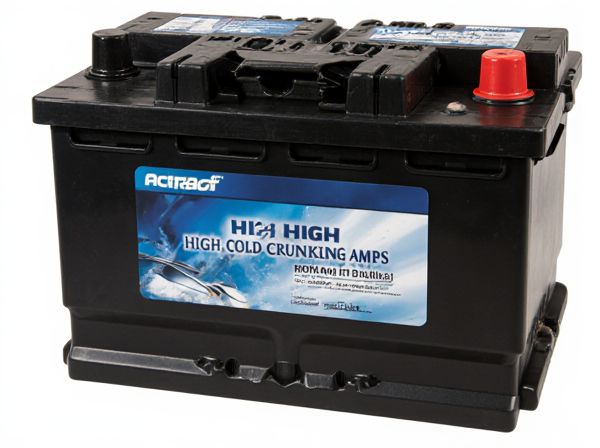
Photo illustration: High Cold Cranking Amps vs Low Cold Cranking Amps
High Cold Cranking Amps (CCA) indicate a battery's superior ability to start an engine in cold temperatures by providing more power quickly. Low CCA batteries may struggle in freezing conditions, leading to slower starts or failure to start. Choosing the right CCA for Your vehicle ensures reliable performance and extends battery life in cold climates.
Table of Comparison
| Feature | High Cold Cranking Amps (CCA) | Low Cold Cranking Amps (CCA) |
|---|---|---|
| Starting Power | Strong engine start in extremely cold temperatures | Limited starting ability in cold weather |
| Temperature Performance | Reliable performance below 0degF (-18degC) | Less reliable below freezing temperatures |
| Battery Size & Cost | Generally larger and more expensive | Smaller and more affordable |
| Lifespan | Often longer due to robust design | May have shorter lifespan under cold stress |
| Best Use | Cold climates and heavy-duty vehicles | Mild climates and standard driving conditions |
Understanding Cold Cranking Amps (CCA)
Cold Cranking Amps (CCA) measure a battery's ability to start an engine in cold temperatures by indicating the number of amps a battery can deliver at 0degF for 30 seconds without dropping below 7.2 volts. High CCA batteries provide stronger starting power in extreme cold conditions, making them essential for vehicles operating in harsh winter climates. Low CCA batteries may suffice in milder temperatures but can struggle to provide reliable starts during freezing weather, impacting overall engine performance.
Why CCA Matters in Battery Performance
Cold Cranking Amps (CCA) measure a battery's ability to start an engine under cold temperatures, making high CCA batteries essential for reliable performance in harsh winter conditions. A battery with a higher CCA rating delivers more power to the starter motor, ensuring quicker and more consistent engine ignition when temperatures drop. Low CCA batteries may struggle with sufficient current flow during cold starts, leading to slower engine cranking or failure to start, highlighting the importance of selecting the correct CCA rating for optimal battery performance.
Differences Between High and Low CCA Batteries
High Cold Cranking Amps (CCA) batteries deliver greater starting power in cold temperatures, enabling engines to start more reliably in harsh winter conditions compared to Low CCA batteries. Low CCA batteries provide sufficient power for milder climates and smaller engines but may struggle in extreme cold, leading to slower or failed starts. The primary difference lies in the ability of High CCA batteries to maintain higher current output at low temperatures, crucial for vehicles operating in freezing environments.
Benefits of High Cold Cranking Amps
High Cold Cranking Amps (CCA) batteries deliver superior starting power in low-temperature environments, ensuring reliable engine ignition even in extreme cold. This enhanced starting capability reduces strain on the battery and starter motor, extending the overall lifespan of the vehicle's electrical components. Vehicles equipped with high CCA batteries experience fewer starting failures and improved performance during harsh winter conditions.
Drawbacks of High CCA Batteries
High Cold Cranking Amps (CCA) batteries provide increased starting power, but they often come with higher costs and increased weight, which can reduce vehicle fuel efficiency. Excessively high CCA ratings can lead to over-engineering, causing unnecessary strain on the electrical system and reduced battery life. Furthermore, these batteries may have shorter service intervals due to accelerated degradation from higher internal resistance and increased heat generation during operation.
Situations Favoring Low Cold Cranking Amps
Low Cold Cranking Amps (CCA) batteries are ideal for mild climate regions where engine starting demands are less intense due to warmer temperatures. Vehicles with smaller engines or those used for short-distance driving benefit from low CCA because of reduced power requirements during ignition. This choice can enhance battery longevity and reduce costs without compromising reliable starts in favorable conditions.
High CCA and Vehicle Compatibility
High Cold Cranking Amps (CCA) indicate a battery's superior ability to start engines in extremely cold temperatures, making them essential for vehicles operating in harsh winter climates. Vehicles with larger engines or diesel models typically require high CCA batteries to ensure reliable ignition performance under low-temperature conditions. Choosing a high CCA battery enhances compatibility with demanding power requirements, reducing the risk of engine stalls and improving overall starting efficiency.
Climate Considerations: High vs Low CCA
High Cold Cranking Amps (CCA) deliver stronger battery performance in freezing temperatures, ensuring reliable engine starts in cold climates below freezing point. Low CCA batteries may struggle to provide sufficient power during extreme cold, increasing the risk of engine starting failure and battery wear. Selecting a battery with a CCA rating matched to local winter conditions maximizes vehicle reliability and extends battery lifespan.
Choosing the Right CCA for Your Vehicle
Selecting the correct Cold Cranking Amps (CCA) is crucial for optimal vehicle performance, especially in cold climates where battery power is essential for starting the engine. A high CCA rating provides greater starting power and is ideal for larger engines or vehicles operating in extremely low temperatures, while a lower CCA rating may suffice for smaller engines or milder climates, ensuring cost efficiency without compromising reliability. Always consult your vehicle manufacturer's guidelines or a professional mechanic to match the CCA rating with your engine size, climate, and driving conditions for maximum battery life and performance.
Frequently Asked Questions on CCA
High Cold Cranking Amps (CCA) indicate a battery's superior ability to start an engine in cold temperatures, providing more reliable performance in winter conditions compared to Low CCA batteries. Frequently asked questions about CCA often address how to choose the right CCA rating for vehicle requirements, emphasizing that higher CCA values ensure better cold-weather starts but may cost more. Understanding CCA is crucial for vehicle maintenance, with experts recommending a battery rating that matches or exceeds the manufacturer's specifications to prevent starting issues in low temperatures.
 caratoz.com
caratoz.com